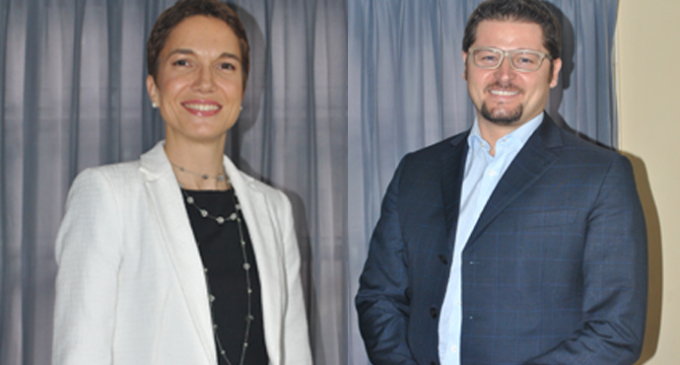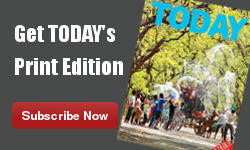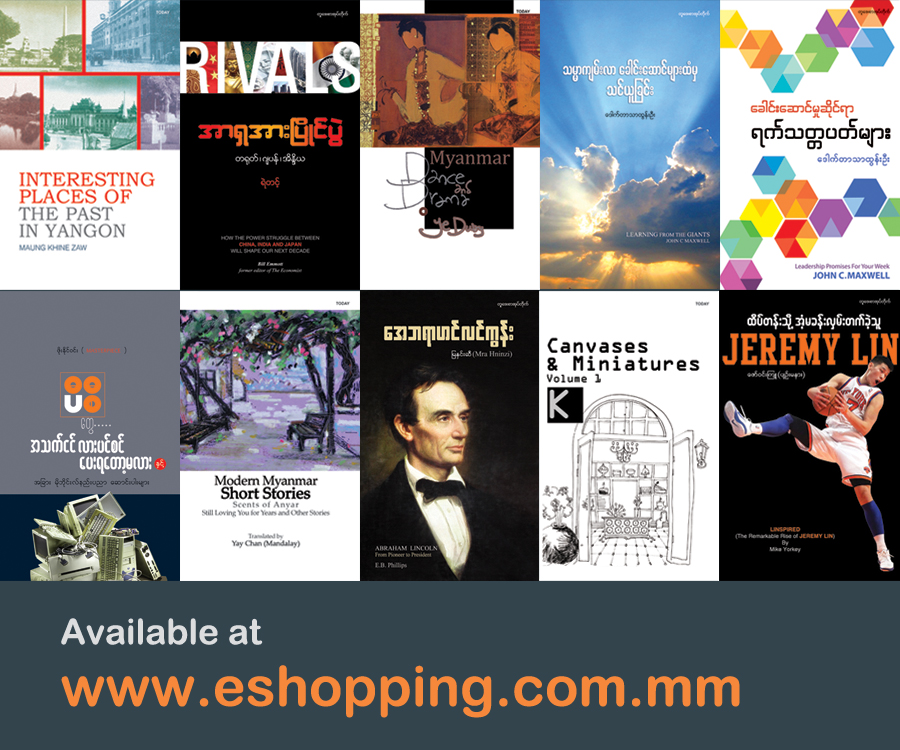Two Envoys From Image Diplomacy

Gabriele Villa and Sorcha Hellyer are Brand Ambassadors for Myanmar having launched the country’s first nation-branding campaign which has aired globally on BBC World News and Channel News Asia. They run Image Diplomacy (iD) – a communications and branding company. Married for over 8 years, Sorcha is British and Gabriele is Italian. Here they describe their experiences and what their time in Myanmar has taught them.

Gabriele Villa
How was Image Diplomacy conceived?
We have been working in the field of communi-cations for over 13 years and had the fortuity to meet thanks to this line of work. For the first 3 years of our relationship we were employed by the same company but were operating in different countries, often on opposite sides of the world. After we decided to settle down and get married we soon realised that we wanted to continue in the profession and decided to go on projects together. It is not always an easy way of life because it requires a great deal of travel-ling and staying away from our loved ones but at least we can work side by side and achieve great results. We are always thoroughly inspired by the countries, people and cultures we visit to help with their image-building exercises.
Image Diplomacy (iD) as a concept came about at the very end of 2009. Having gained nearly 10 years of experience working for other companies, we were actually encouraged by prior clients to branch out. iD was born out of a passion to provide a client-centric service which was flexible enough to counteract the negative effects of the global financial crisis.
That approach has created long-lasting relationships with satisfied customers that appreciate both the personal and professional investment iD makes in getting it right. As for the name, many have asked us about this. Our philosophy is that all image-building and nation-branding initiatives require the full support of all entities and citizens. Let’s face it, when you arrive in a country every impression – especially first ones – really count. Diplomacy is not just about political activities – citizen diplomacy is essential for the good reputation of a country. How you are treated by people – from the customs agents at the airport to the taxi driver who takes you to your hotel – can either positively or negatively impact on how you perceive a nation. Everyone can play their part and Myanmar is lucky to be blessed with kind people who mean well.
When and how did Image Diplomacy start work with Myanmar?
iD came to Myanmar last September to under-take the preparation of special features for the UK’s biggest selling quality newspaper, The Daily Telegraph. We have now produced three features averaging 8,000 words each, recount-ing the reform process, key sectors in the economy and the areas of investment. The aim is to highlight the impressive changes taking place in Myanmar and increase trade with, and investment from, the UK. Very soon after arriving we realised that the World Economic Forum on East Asia (held in Nay Pyi Taw in June) was a phenomenal opportunity for the country to show the global community how Myanmar is opening up to the rest of the world and to celebrate this transformation.
 What were the particulars of Image Diplomacy’s work in the country?
What were the particulars of Image Diplomacy’s work in the country?
While still continuing our work for The Daily Telegraph, last year we proposed a campaign that would be launched at the WEF to capitalise on the visits of global leaders from government and business. It was filmed during the water festival and consists of a 30-second TV commercial, a 4-minute tourism showcase both demonstrating the beauty of Myanmar as well as a 5-minute showreel which highlights the nation’s socio-economic scenario. When choos-ing the theme of the nation-branding, we felt that we should focus on Myanmar’s rich cultural heritage. Many people are not aware of the country’s offerings and we wanted to create an alluring campaign that would inspire travellers and investors alike. As for the tagline of the campaign, we were determined to steer clear of adjectives. There are so many nations using words like “amazing” or “incredible” or “sparkl-ing” – some of which have been effective but others fail to fully capture the essence of the national identity. After considering over 70 taglines, iD was delighted to come up with “Let the journey begin” since we feel that it expresses Myanmar’s current situation as well as the desire to welcome people to explore and better understand the nation and a wish to make progress after a period of isolation. We worked in close collaboration with the government of Myanmar to achieve these 3 films in an extrem-ely tight timeframe. We were also very fortunate to have strong support of private sector players too, from the hotels to the local airlines.
To further strengthen the branding initiative, iD organised a press conference with the WEF and created an exhibition stand to show the films. We also put together a coffee-table book full of fabulous photos of Myanmar. It was given to all the high-level delegates in a similarly branded gift bag, along with a branded folder with information on the campaign and a branded USB key with the films on. We also commissioned a beautifully handcrafted gift which was included in the bag – a mother of pearl plate fashioned in the shape of a leaf. The idea was to give each WEF delegate a real taste of Myanmar – one they would take away with them, share with their family and friends. This part of the campaign was made possible by two private sector sponsors who supported the branding process and helped raise the profile of the country. For more infomation please visit www.imagediplomacy.com.
How can interested parties view the campaign?
The TV commercial is still airing on BBC World News and will soon roll out on CNN too. However it can also be viewed on demand, along with the 4-minute tourism showcase, by visiting www.myanmarbranding.com. A digital version of the book is also available on this website. It has also been aired on Skynet. With assistance from the Ministry of Hotels and Tourism, iD also organised for all 3 films to be aired at Yangon and Nay Pyi Taw airports and we have given a number of hotels the high-resolution versions to show in their establish-ments. We welcome enquiries so if anyone else is interested in airing the campaign we invite them to contact us on iD@myanmarbranding.com.
We would like more people – both locally and internationally – to fully appreciate Myan-mar’s tourist destinations. This is why we worked with one of the world’s top cinemato-graphers, Ron Fricke for the nation-branding campaign. Ron is renowned for his use of motion control equipment which gives a truly elegant sensation to the film, it is as if the viewer glides towards what is being shown. The pieces on Myanmar’s cultural and tourism offerings literally capture the nation’s richness, culture and sense of positivity. What Ron achieves really is a work of art.
How much importance is attached to the role of tourism in the country?
Tourism is perhaps one of the most critical sectors to enable a change in a nation’s reputa-tion. As mentioned before, every citizen is a diplomatic agent since tourism impacts on so many different industries and sectors of the economy. Each person is representative of a country’s image. From a street vendor to a worker in a 5-star hotel so it is our hope that this campaign will also make the people of Myanmar understand how they are all responsi-ble for how the country is perceived. Conclusions will follow. Equally if visitors have a good experience they will recount it when they go back home. They too become ambassadors for the country. Handling the changes in supply and demand, upgrading infrastructure and bringing services up to a global standard are all vital but the humanity of the people of Myanmar, their kindness and warmth is a truly impressive offering. And let’s not forget that it costs nothing! If the image of Myanmar in international media has been less than desirable in the past, we hope that visitors will experience the REAL Myanmar for themselves and understand how special the country is.
What is your education and work experience?
Sorcha: I graduated from Royal Holloway, University of London, with a degree in French and Drama. Initially I worked at BGB, a renowned, London-based PR company special-ising in travel and tourism. However my desire to be part of the landscape of the world means that I have been globetrotting since 1999.
Gabriele: I studied Tourism and Political Science and have been working abroad since my early 20s. I travelled to more than 50 different countries and did projects in more than 25. It has been an incredible time in my life and now I am enjoying enchanting Myanmar.
Why did you choose to learn French?
Sorcha: Learning another language opens your mind. In fact I learned German as well as French but I preferred the latter. French, to my mind, is beautiful and romantic, and hence it became one of my specialised subjects. However, being based in London did not require me to use my linguistic abilities so I started working abroad and eventually used my French on a project in Mauritania. That said, after I met Gabriele Italian became my second language and French is now in third place. Gabriele is gifted as he speaks four languages.
Gabriele: Besides my mother tongue Italian I also speak fluent English and know French and Spanish. Unfortunately I currently have very little knowledge of the Myanmar language, but plan to learn it soon.
How important is local language efficiency in starting work in a foreign country?
Sorcha: It’s very important indeed. Of course many people in Myanmar speak English and over 80% of business transactions worldwide take place in English but in order to be culturally sensitive and aware, we believe it is vital to at least know the basics. We try to learn elements of the local language in every country we visit. To date we have been to about 50 countries each so you can imagine how difficult it is to recall all the different languages.
What methods are supportive in learning a language and cultural norms?
Gabriele: Of course we learn a lot about before visiting for a nation-branding campaign but nothing beats being in the country itself. We find that the best method is to be in personal contact with locals to learn directly from them. Besides the language learning, this broadens your outlook as to the culture and how native people perceive themselves, their country and their future. In professional terms, we undertake a great deal of research in the process of our work we do and we take a broad view based on many varying opinions taken from different strata of society. We have often been told by our clients that it is our genuine love for a country that sets us apart from other people who visit and then leave. We believe that it is this level of tangible interest that makes iD stand out from the crowd. In fact, it explains why our corporate tagline is “communicating with passion”.
What are your thoughts on the people of Myanmar and our struggle to develop?
As a nation, we have been struck by how warm the people are here. We have been based in Yangon for over 10 months now and our opinion hasn’t changed. On our travels around the country we have regularly asked other visitors what they think of the country and it almost always echoes our feelings. Most tourists cite the kindness of the Myanmar people as being a very alluring experience – and usually one that they feel has been lost in many other countries. The simplicity and authenticity of the Myanmar lifestyle renders the country a very special place. Of course we would like to see progress and a better quality of life for everyone in the country but at the same time we hope that in the future the people of Myanmar will remain as genuine and helpful as they are today. The Myanmar hospitality could become truly legendary worldwide.
In terms of development, it goes without staying that upgrading infrastructure, healthcare and education is imperative, as is the creation of employment opportunities in order to provide more opportunities for the locals. We hope that our efforts to raise the profile of Myanmar will increase tourism, trade and investment. Against a backdrop of fast-paced reforms it is important for Myanmar to show off its attributes to the world. The country has survived many socio-economic disadvantages but when it comes to the ability of its people to embrace the current transformation..well only time will tell! Currently an uplift is needed and a change in mentality will be important for Myanmar to realise its full potential.
Where have you been in Myanmar?
We have spent time in Nay Pyi Taw, Yangon, Bagan, ChaungTha, Ngapali, Mandalay, Inle Lake among other destinations. There is much more to explore and we are looking forward to undertaking the next part of the campaign to see many other places.
What Myanmar food do you enjoy?
There are so many flavours to savour but we especially like Mohinga, Shan noodles and Kachin pounded-fish.
./wp-content/uploads/2018/10/Emirate-Online-TDY.png)


















There are no comments at the moment, do you want to add one?
Write a comment